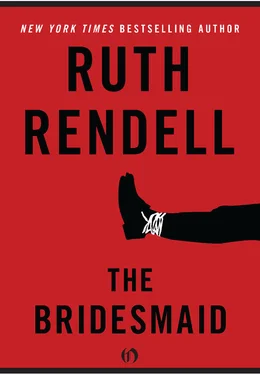Ruth Rendell - The Bridesmaid
Здесь есть возможность читать онлайн «Ruth Rendell - The Bridesmaid» весь текст электронной книги совершенно бесплатно (целиком полную версию без сокращений). В некоторых случаях можно слушать аудио, скачать через торрент в формате fb2 и присутствует краткое содержание. Год выпуска: 2010, Издательство: Open Road Integrated Media LLC, Жанр: Триллер, на английском языке. Описание произведения, (предисловие) а так же отзывы посетителей доступны на портале библиотеки ЛибКат.
- Название:The Bridesmaid
- Автор:
- Издательство:Open Road Integrated Media LLC
- Жанр:
- Год:2010
- ISBN:нет данных
- Рейтинг книги:3 / 5. Голосов: 1
-
Избранное:Добавить в избранное
- Отзывы:
-
Ваша оценка:
- 60
- 1
- 2
- 3
- 4
- 5
The Bridesmaid: краткое содержание, описание и аннотация
Предлагаем к чтению аннотацию, описание, краткое содержание или предисловие (зависит от того, что написал сам автор книги «The Bridesmaid»). Если вы не нашли необходимую информацию о книге — напишите в комментариях, мы постараемся отыскать её.
The Bridesmaid — читать онлайн бесплатно полную книгу (весь текст) целиком
Ниже представлен текст книги, разбитый по страницам. Система сохранения места последней прочитанной страницы, позволяет с удобством читать онлайн бесплатно книгу «The Bridesmaid», без необходимости каждый раз заново искать на чём Вы остановились. Поставьте закладку, и сможете в любой момент перейти на страницу, на которой закончили чтение.
Интервал:
Закладка:
“It was all true, then?” he managed to say.
She nodded. She seemed surprised, but in a simple chidllike way. “Oh, yes, it was all true. Of course it was.”
“The part about following him and going up to him and saying you had something in your eye—that was true?” He could hardly say the words but he said them: “And stabbing him—that was true?”
“I told you. Of course it was true. I didn’t know you doubted me Philip. I thought you trusted me.”
In a fever of fear and disbelief and panic, he had driven straight to her from Chigwell. He had neither returned to head office nor gone home, so it had been quite early when he arrived. And for once, for the first time perhaps, she had seen him arriving from the basement window. Her smile had died when she saw his face.
He had brought no wine, no food. It was the end of his world, or so he had felt when he pounded down the basement stairs. He would never eat or drink again. It was she who said—after she had answered all his questions and confirmed it all, when he had no more words—“Shall we have some wine? I should like to. Would you go out and get some, Philip?”
Out in the street he was a hunted person. It was a new feeling. On the way here he had been frightened, but afraid only of what she might tell him, of what her looks and her words would confirm. Now that he knew for sure, he felt pursued. Before the weekend he had reached a point at which he believed almost nothing she told him until it was confirmed by outside authority, he had nearly come to switch off belief when she began spinning a narrative. That authority had confirmed her part in the television serial, and he had been happy, had been relieved. It was strange that now, when she recounted the most incredible things she had ever told him, he believed her utterly. There was no doubting anymore.
He bought two bottles of cheap white wine. Even before he was back in her room, he knew he couldn’t face drinking any of it. He must keep his head clear. Oblivion was not for him, still less the sloppy euphoric fuzzy state they so often reached, when sex was slipped into like the dreams that come at dawn, as easily found and as dazedly yielded to. As he came back to the room, passing from the dusty heat of upstairs to the cool dimness below, the facts, the truth, slammed back at him once more, the reality that she had murdered in cold blood a defenceless stranger, and he whispered to himself in incredulity. “It can’t be, it can’t be. …”
She began drinking the wine greedily. He carried his glassful with him out to the tap, poured it away, refilled the glass with water.
In those smoky green glasses you couldn’t tell whether the contents were wine or water. She put out her hand to him. “Stay the night with me. Don’t go home tonight.”
He looked at her in despair. He spoke his thoughts aloud. “I don’t think I could go home. I feel as if I couldn’t leave this room, I couldn’t see other people. I can only be with you. You’ve made it impossible for me to associate with others.”
This seemed to please her. He even had the momentary feeling that this had been her whole purpose, to set the two of them apart, to make them unfit for other company. He saw the madness in her face again, in the unfocussed gaze, the sublime indifference to all that perplexes and horrifies humanity. It was Flora’s face. That look had been on the marble features when he had seen her a lifetime ago lying in the flower bed in Arnham’s garden. This time he didn’t try, as he had tried once before, to dispel from his own mind the notion of her madness. If she was mad, she couldn’t help herself. If she was mad, she was helplessly unable to control what she did.
He took her in his arms. It was horrible, there was no pleasure in holding her like this. It was like holding some decaying drowned thing or a sack of garbage. He almost retched. And then pity came, for her and for himself, and he began to cry, with his face on her shoulder and his lips pressed into her neck. She stroked his hair. She whispered to him, “Poor Philip, poor Philip, don’t be sad, you mustn’t be sad.…”
He was alone in the house. He sat in the window of the living room, watching the light fade in the street. Glenallan Close, in a sunset like this one, bathed in pale red light, windless and basking, was as beautiful as it could ever be.
It had been a night and a day of almost continuous unrelieved suffering, incredible to look back on, beyond belief that two people had been able to bear it. Of course, there had been no question of his going to work. After that sleepless night, those long crawling hours in which she had dozed and awakened by turns, had begged him to make love to her, once gone down on her knees to him with infinite pathos, and still he had failed—after all that, he had gone up to the phone in the hall at eight in the morning and phoned Roy at home. He had no need to simulate a hoarse voice, a dry throat, an almost communicable weariness. All that was there already, as the result of those dreadful hours.
And with the coming of the sun it had begun again. No doors or windows had been opened the night before and the heat grew like an oven warming. Senta, who had slept till he came back, awoke and began crying. He wanted to hit her again then, to stop that meaningless, pointless moaning. To keep himself from striking her, he clutched his hands together. Violence that had been alien to him he was learning. He was learning that we are all capable of almost anything.
“You must stop,” he said. “You must stop crying. We have to talk. We have to decide what to do.”
“What is there to do if you won’t love me?”
Her face was sodden with weeping as if the skin had blotted up the tears. Wet strands of hair stuck to her face.
“Senta, you must tell me.” A thought struck him. “Tell me the truth now. You have to tell me only the truth from now on.”
She nodded. He felt she was placating him, agreeing in order to avoid more trouble. Her eyes had become wary, greener and sharper, within their swollen lids.
“What did you mean when you said it wasn’t the first time? You told me when you were talking about the police that this wasn’t the first time. What did you mean?”
There was a pause while her eyes shifted, looked into the mirror, back at him. She spoke so innocently, in a way calculated to disarm.
“I mean I killed someone else once. I had this boy friend called Martin, Martin Hunt—I did tell you that. I did tell you there was someone before you. I thought he was the one. It was before I ever saw you. Long before we met. You don’t mind, do you, Philip? You don’t mind? If I’d known, I’d never have gone near him, I’d never have spoken to him if I’d known I was going to meet you.”
He shook his head. It was a feeble ineffectual protest at something he didn’t understand but which he knew was monstrous. “What about him?”
Instead of replying, she said, creeping close to him but receiving no welcome, no warmth, “You are going to protect me and save me and go on loving me, aren’t you? Aren’t you?”
It terrified him because he didn’t know the answer. He didn’t know what to say. He didn’t know what he was more afraid of, the law and the power of it out there, or her. It was important to him, as a man, to be afraid of neither. He forced himself to put his arms round her and hold her.
“I was jealous,” she said, her voice muffled. “If you ever found another girl, I’d kill her, Philip. I wouldn’t harm you but I’d kill her.”
She had told him nothing but he lacked the heart to persist. He had held her in a mechanical way, his arm becoming a clamp strong enough to support another human being in its hinged angle. It was rather like the way in which he had carried Flora to Arnham’s house. She felt as heavy and lifeless as stone.
Читать дальшеИнтервал:
Закладка:
Похожие книги на «The Bridesmaid»
Представляем Вашему вниманию похожие книги на «The Bridesmaid» списком для выбора. Мы отобрали схожую по названию и смыслу литературу в надежде предоставить читателям больше вариантов отыскать новые, интересные, ещё непрочитанные произведения.
Обсуждение, отзывы о книге «The Bridesmaid» и просто собственные мнения читателей. Оставьте ваши комментарии, напишите, что Вы думаете о произведении, его смысле или главных героях. Укажите что конкретно понравилось, а что нет, и почему Вы так считаете.











